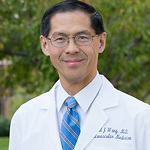Paul Wang, MD
This page provides information about a featured electrophysiologist, cardiologist, cardiothoracic surgeon, hospital, heart hospital, arrhythmia center, or atrial fibrillation center.
On this page you will find an overview of this atrial fibrillation patient services provider's atrial fibrillation treatments and background, as well as information about this provider's specialized afib procedures, such as catheter ablation, maze surgery, or the mini maze procedure, and the provider's treatment results, when available. There are also reviews by other afib patients, when available.
Provide a Patient Review List Your Services with Us
300 Pasteur Drive, 2nd Floor
Stanford, California 94305
United States
Phone: 650-723-0666
About
Dr. Wang is a board-certified electrophysiologist and the Director of the Stanford Arrhythmia Service and Co-Director of the Stanford Center for Arrhythmia Research. He has over 26 years of experience as an expert in the treatment of cardiac arrhythmias, including atrial fibrillation, atrial flutter, ventricular arrhythmias, supraventricular arrhythmias, and sudden cardiac death.
Dr. Wang considers the best treatment option to improve a patient’s arrhythmia, and works closely with Stanford cardiac surgeons to provide patients with the most minimally invasive treatment options for their arrhythmia. Dr. Wang was a co-inventor of catheter cryoablation and has pioneered new techniques in the management of heart rhythm problems.
As the Director of the Stanford Arrhythmia Service and the Stanford Arrhythmia Research Center, Dr. Wang is at the forefront of research for the latest state-of-the-art diagnostic and therapeutic treatment options to manage all types of arrhythmias. FIRM atrial fibrillation mapping is a breakthrough heart-mapping technology and was developed by Stanford physicians. This new treatment option pinpoints where the arrhythmia started in the heart and guides precision treatment so that the condition can often be addressed in a single procedure.
Dr. Wang has co-authored numerous textbooks and book chapters on catheter ablation, implantable defibrillators, sudden cardiac death, cardiac resynchronization/ biventricular pacing therapy, and innovations in arrhythmia therapy. He is past Chair of the American Heart Association Council on Clinical Cardiology ECG and Arrhythmias Committee, and is a former member of the Board of Trustees of the leading professional society in his field, the Heart Rhythm Society. He has helped write the examination used for certification of heart rhythm specialists in the U.S. Dr. Wang also founded the annual Stanford Biodesign New Arrhythmia Technologies Retreat, focusing on new technological advances in arrhythmia management and diagnosis. Dr. Wang will begin soon a 5-year position as Editor-in-Chief of one of the leading journals in the field, Circulation: Arrhythmia & Electrophysiology.
Dr. Wang received his medical degree from the College of Physicians and Surgeons Columbia University, and completed his fellowship in Cardiovascular Diseases and Cardiac electrophysiology at Brigham and Women’s Hospital Harvard Medical School.
See more information about Dr. Wang.
Helping Arrhythmia Patients Get their Rhythm Back: View more information about the Stanford Arrhythmia Service, including video clips of FAQs here.
Atrial Fibrillation Procedures
The Stanford Arrhythmia Program, led by Dr. Wang, offers arrhythmia patients the latest treatment options for atrial fibrillation, including:
- Balloon Cryoablation
- Focal Impulse and Rotor Modulation (FIRM) atrial fibrillation mapping
- Radiofrequency Energy Contact force-guided ablation
- Hybrid surgical-catheter ablation
- Atrial Fibrillation Surgery (MAZE)
- Minimally Invasive Cox-Maze ablation
- A-V Junction Ablation and Pacemaker Implantation
- Left Atrial Appendage Occlusion Procedures
- Medications
Specialized Procedures
Treatments
Dr. Wang and the expert cardiacelectrophysiologists at the Stanford Arrhythmia Research Center perform over 1,000 arrhythmia procedures a year and offer a variety of surgical and non-surgical treatment options to control and correct arrhythmias. These treatments include:
- Medications
- Lifestyle changes
- Catheter ablation
- Minimally invasive surgery
- Devices to help your heart beat normally (ie. Pacemakers and implantable defibrillators)
After Dr. Wang diagnoses the condition and determines its cause, he works with the patient to determine the best treatment plan that will be the most effective at controlling or correcting the arrhythmia. He offers patients the latest, clinically proven treatment options for arrhythmia, including catheter ablation and hybrid surgical catheter ablation. Dr. Wang and his team were involved in inventing or developing catheter cryoablation and edge focal impulse and rotor modulation (FIRM). The major trials leading to FDA approval for balloon catheter cryoablation and radiofrequency energy contact force were performed at Stanford by Dr. Wang and his team. Stanford is one of the leading centers in the world performing these procedures. Dr. Wang has co-authored one of the most comprehensive papers on catheter cryoablation. Hybrid surgical catheter ablation (also known as Hybrid Maze catheter ablation procedure) combines minimally invasive surgical ablation for the outer (epicardial) portion of the heart, with catheter ablation of the inner (endocardial) part of the heart.
Find common FAQs about types of arrhythmia and treatment options can be found here.
Clinical Trials & Research
Dr. Wang and the Stanford Arrhythmia Research Center are committed to ongoing research to advance the understanding and treatment of atrial fibrillation. Clinical research studies may be sponsored by the National Institutes of Health, other governmental agencies, industry, or Stanford arrhythmia doctors. Learn more about the latest clinical trials.
Publications
Dr. Wang has over 100 clinical publications which can be found here.
